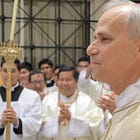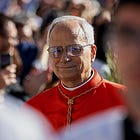Leo XIV affirms Francis’ climate vision, calls COP30 prep a 'synodal work of discernment'
Prevost’s message continues Francis’ push to align the Synodal Church with UN climate goals.
Leo XIV’s message continues Francis’ push to align the Synodal Church with UN climate goals.
Leo XIV affirms COP30 and backs synodal discernment in support of UN climate agenda
In a brief message on Tuesday 20 May 2025, Leo XIV urged Catholic university leaders to back the United Nations climate agenda, calling participants to “build bridges,” and encouraging them in their “synodal work of discernment” in preparation for COP30.
The address was delivered via video to the Network of Universities for the Care of the Common Home, meeting at the Pontifical Catholic University of Rio de Janeiro to mark the tenth anniversary of Laudato si’, the eco-encyclical issued by Francis in 2015. That document was pivotal in aligning the Vatican with global environmental movements.
Leo XIV expressed full support for the universities’ role in shaping future climate policies, specifically referencing their planned synodal deliberations for COP30—set to take place in Brazil in 2025.
He affirmed a proposal promoted by Francis earlier this year: that countries consider not only a “remission of public debt,” but also an “ecological debt”—a term popularised by radical environmentalists to pressure industrialised nations into transferring wealth and sovereignty to global bodies in the name of justice.
“You will reflect together on a possible remission of the public debt and of the ecological debt, a proposal that Pope Francis had suggested in his message for the World Day of Peace,” Leo XIV said. “And in this jubilee year, a year of hope, this message is so important.”
He further praised efforts to build “bridges of integration between the Americas and the Iberian Peninsula,” calling on Catholic institutions to pursue “ecological, social and environmental justice”—language that mirrors UN talking points.
Hermeneutic of Continuity – with Francis
Prevost’s address marks a clear continuation of Francis’ reign. Francis, via Cardinal Pietro Parolin, delivered an address to the UN’s COP28 in 2023, demanding “obligatory and readily monitored” measures in order to facilitate a global “ecological transition.”
He also called for new forms of “global governance,” linking them to a concept of “ecological debt” and invoking Laudato si’ and Laudate Deum as theological justifications for political transformation.
Francis’ address was delivered in the UN Climate Change Conferences “Faith Pavilion,” which was hosted by Islamic leaders. COP28 leaders stated that the Faith Pavilion was intended “demonstrat[e] that religious and spiritual communities are essential to the fight against climate change and to achieving the Sustainable Development Goals (SDGs) and the goals of the Paris Agreement.” Francis also signed a formal interfaith pledge in Abu Dhabi backing these goals.
Leo XIV’s latest message reveals no deviation from this vision, and frames the climate agenda as a field for a “synodal work of discernment.” He refers to “ecological debt” – the idea that the “Global North” owes a debt to the “Global South” for the environmental damage caused.
In practice, it functions as a tool for wealth redistribution, geopolitical pressure, and the erosion of national sovereignty.
In endorsing “ecological debt,” synodal discernment, and the integration of Catholic institutions into UN climate structures, Leo XIV signals his continuity with Francis’ ideological trajectory.
Video Message of the Leo XIV to the Pontifical Catholic University of Rio de Janeiro on the occasion of the Tenth Anniversary of the Encyclical “Laudato si’”
Taken form Vatican Press Office
20 May 2025
The following is the text of the video message sent by the Holy Father Leo XIV to the Network of Universities for the Care of the Common Home, meeting at the Pontifical Catholic University of Rio de Janeiro on the occasion of the Tenth Anniversary of the Encyclical “Laudato si’”:
Video Message of the Holy Father
Dear brothers and sisters, I want to send this greeting, a big greeting, to the Network of Universities for the Care of the Common Home. I know you are gathered at the Pontifical Catholic University of Rio de Janeiro and that you have this beautiful occasion of the tenth anniversary of the Holy Father Francis’ document, the Encyclical Laudato si’.
I know you are about to carry out synodal work of discernment in preparation for COP30. You will reflect together on a possible remission of the public debt and of the ecological debt, a proposal that Pope Francis had suggested in his message for the World Day of Peace. And in this jubilee year, a year of hope, this message is so important.
I would like to encourage you, university rectors, in this mission you have taken on: to be builders of bridges of integration between the Americas and the Iberian Peninsula, working for ecological, social and environmental justice. I thank you all for your efforts and your work. I encourage you to continue to build bridges.
And I would like to conclude with a blessing, trusting that the grace of God may always be with you: may the blessing of God Almighty, Father, Son and Holy Spirit, descend upon you and accompany you always.
Amen.
HELP KEEP THE WM REVIEW ONLINE WITH WM+!
As we expand The WM Review we would like to keep providing free articles for everyone.
Our work takes a lot of time and effort to produce. If you have benefitted from it please do consider supporting us financially.
A subscription gets you access to our exclusive WM+ material, and helps ensure that we can keep writing and sharing free material for all.
(We make our WM+ material freely available to clergy, priests and seminarians upon request. Please subscribe and reply to the email if this applies to you.)
Subscribe to WM+ now to make sure you always receive our material. Thank you!
Further reading:
Follow on Twitter, YouTube and Telegram:





We need one of those Anathema day counters where it counts the minutes and hours since the last anathema has been written.